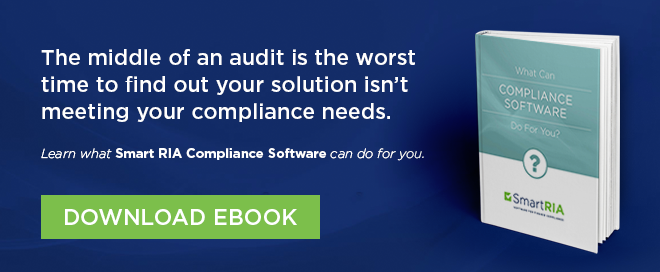
RIA compliance can be so difficult to navigate that it’s easy to lose sight of what it’s all about. Compliance isn’t busywork to keep the SEC off our backs; it’s a safeguard for you and your clients, one that protects both you and them.
Frankly, clients should be wary of RIAs who treat compliance as a burden. They should instead look for RIAs who see it as a necessary part of the job and integrate it throughout every step of their processes, fostering a culture of compliance.
It’s possible that your clients’ first exposure to compliance will be the start of your relationship, when you present them with the brochure portions of Form ADV. When this happens, be prepared to field a variety of questions and have answers ready that will be easy for them to understand. Here are a few things your clients should know about RIA compliance.
Compliance Protects the Client
RIA compliance exists to help ensure that clients are treated as fairly and honestly as possible when it comes to their investments. As in any other profession, there are some bad advisors in the wealth management industry who use dishonest or manipulative tactics to exploit their clients’ holdings for their own personal gain.
In other cases, the advisor may simply be behind on updates to compliance mandates—but ignorance can still be a liability. While an RIA is charged with making financial gains for their clients, that gain should come as a direct result of collaboration and success, not fraudulent or erroneous business practices.
Compliance requires an RIA to inform the client in plain terms how their money will be handled, how much they will be charged in fees, any potential conflicts of interest, and many more factors that affect the client’s wealth. Instruct your clients to read your brochures carefully and make sure they feel comfortable coming to you with any questions.
Compliance Can Change
The SEC and state requirements for compliance can change based on industry conditions, and so can your firm’s compliance information. Tell your clients that whenever there is a change to the information in your brochure, you are required to inform them of those changes.
Be sure to let your clients know whether you fall under the jurisdiction of state regulators or the SEC, and tell them what conditions could change that. You may also want to suggest that your clients follow the SEC’s own news feed so they can stay aware of any policy changes and initiatives.
Assure your clients that you stay up to date on compliance standards, and tell them what methods you use to do so. Informing them that you use a turnkey compliance software solution like SmartRIA can help them realize that you are ahead of the game in terms of compliance.
Compliance Commands Loyalty
The requirements of RIA compliance place you squarely in your clients’ corner, coaching them towards the best wealth management options. This is called a fiduciary duty, and any breach of that duty can result in consequences for your firm.
Call your clients’ attention to the name and contact info of your chief compliance officer and be sure they know who to contact if they have concerns about how their money has been managed. Provide them with a link to the SEC’s complaints page or a similar page for your state’s regulators.
As a registered investment advisor, you’re not just marketing your business savvy. You’re marketing your honesty as well. Being up front about RIA compliance is your first step on the road to building lifelong relationships of trust with your clients.


